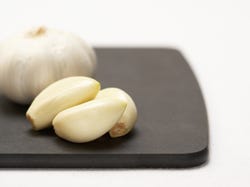Garlic: better in food or supplements?Garlic: better in food or supplements?

While it's usually roasted, sautéed and incorporated into sauces, recent research published in the Journal of Clinical Nutrition may give you another reason to love the unadorned, lowly allium: garlic’s extract may help lower blood pressure.
Australian scientists from The University of Adelaide divided 79 study participants into four groups. Each group took 240 mg, 480 mg, or 960 mg aged garlic per day, or a placebo, for 12 weeks.

After the study, researchers found that blood pressure was significantly lower in the middle-dosed group who had received 480 mg of aged garlic per day—some people experienced a whooping 11.8 mmHg reduction in systolic blood pressure (the force of blood in arteries as your heart beats) as compared to the placebo group.
Garlic's ancient past
Garlic's purported health powers have been known for millennia—Ancient Egyptians believed it provided physical strength (in fact, it was found inside the pyramids), and “Hippocrates, the revered physician, prescribed garlic for a variety of conditions” including toothache and digestive issues, according to the Journal of Nutrition. Plus, modern medicine tells us that garlic contains sulfuric compounds such as allicin, which may combat oxidative stress and inflammation that contributes to reduced immunity.
Not surprisingly then, the Australian study parallels existing research suggesting garlic’s heart health benefits. For example, an earlier study in 2012 found that aged garlic extract improved blood vessel linings when combined with coenzyme Q10. Another particularly intriguing meta-analysis found that garlic consumption may reduce cholesterol and triglyceride levels.
Get the most from garlic
Most of the available garlic research explores the aged garlic extract, and for good reason. If you think about traditional usages of garlic, it's almost always processed to some degree (fermented, cooked, pickled, etc.), reducing raw garlic’s biting spiciness. Aging garlic diminishes it’s off-putting scent and harsh and irritating compounds. Some believe aged garlic renders the beneficial sulfuric compounds more bioavailable too.
Whether similar effects are gleaned from cooking garlic is not completely understood—would sautéed garlic with olive oil, onion, and Swiss chard improve your heart in such a way that an aged garlic supplement might? Would roasting whole garlic cloves in foil, until they were buttery and sweet and luscious, make your cholesterol plummet?
I’m not entirely sure. But I suspect when this eons-old, delicious food is incorporated into everyday foods, something good is bound to occur.
Your turn: Do you think you'd get better heart-health results with an aged garlic supplement or simply adding garlic to food?
About the Author
You May Also Like





